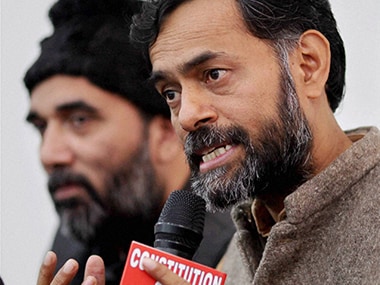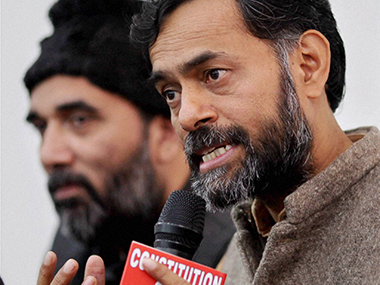The Aam Aadmi Party’s ‘vision’ problem represents the biggest question mark hanging over the renegade political force in the Lok Sabha elections. There is barely a month left for the elections, and yet it has not offered voters a concrete blueprint of its national agenda, be it on economic or foreign policy. Not one of its leaders, including Arvind Kejriwal, has been able to effectively and clearly answer the inevitable barrage of policy questions. [caption id=“attachment_1434319” align=“alignleft” width=“380”]  AAP leader Yogendra Yadav. PTI[/caption] Weary after 16 hours of campaigning in Mewat, which is a part of his Gurgaon constituency, AAP’s chief policy maven Yogendra Yadav sat down to speak with Firstpost, and offered an exclusive take on his party’s achilles heel. According to Yadav, the party has a 35-page document on policy reforms which has not been revealed to the public as the top party leaders “did not get any time to sit and reflect on it.” And one of the biggest hurdles in the way of publishing the policy statement is the section of economic policies – “Or the lack of it.” “Everything got jammed because of the economic policy. Because on economic policy there was no clear opinion on what our party stands for,” says Yadav. “It is difficult for a new political party, which began on one single plank, to see what its economic implications are,” he told Firstpost, “There are no difference on opinion on issues like social justice or secularism but when it comes to economic policies, there is a lack of opinion because understanding economic policies beyond generalities requires in-depth knowledge of how the economy runs. And for that we still do not have enough depth.” This lack of ‘homework’ has also stalled progress in other areas such as foreign policy, judicial reforms and most importantly, political reforms. “We simply did not have the time that is required to reflect on policy reforms,” says Yadav. Yadav readily concedes the fact that the absence of a document on its policy reforms have hurt the party. “It has cost us some support in the thinking classes. But on the whole, the reaction that goes out is that we are erratic or it’s a knee jerk reaction or that there is no overall frame that binds us. Therefore the availability of this document in the public domain would have enabled us to talk about our vision on certain reforms in a better way,” says Yadav. Yadav is keenly aware that the Lok Sabha election is not going to be the same as the assembly election in Delhi, and blames the recent controversies over ticket allocation to this distinction. “Our party members have to understand that the Lok Sabha elections are a completely different ball games and requires someone with a far more outreach than an assembly candidate needs,” says Yadav, explaining the logic behind fielding candidates like journalists like Ashutosh or Ashish Khetan against Congress heavyweights Sibal and Ajay Maken. When asked if the AAP has become complacent in Delhi and is therefore fielding candidates without a substantial political background, Yadav denies it, saying “Winning a assembly election in Delhi would have been easier but the Lok Sabha polls are going to be one tough fight for us.” On the subject of the media, Yadav maintains a similar – if less harsh – stance as his party chief Arvind Kejriwal. “Arvind Kejriwal was specifically asked by the India Today to take their chartered flight. Arvind always wanted to do a video conference. Now if you decline, you make enemies. And if you take the service, that makes story,” he says with a smile to blunt the criticism.
In an exclusive interview with Firstpost, Yadav talks about his party’s lack of policy agenda, ticket allotment controversies and AAP’s relationship with the media.
Advertisement
End of Article


)
)
)
)
)
)
)
)
)



